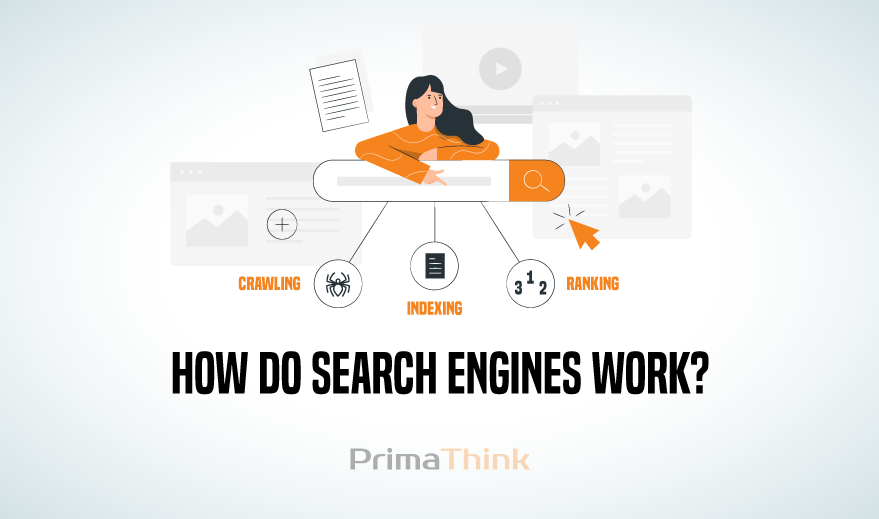Table of Contents
Search Engine :
As a society, we have all grown dependent on search engines. Today, it’s easier than ever to run to the internet and find the answer to nearly any query. From our most personal questions to the most basic. How do search engines work, have become our main source for finding information.
Search engine insights:
All the time, search engines work through 3 main areas: Crawling, Indexing, and Ranking. Think about how often and why you use Google, or other search engines to find products or information, or have you ever stopped to wonder how they do it? How do search engines work? What is actually behind it? How many types of search engines are there?
Working of search engine:
To discover, categorize, and rank the billions of websites that make up the internet, search engines employ sophisticated algorithms (algorithms are a set of instructions designed to perform a specific task) that make decisions on the quality and relevancy of any page. It is a complex process involving significant amounts of data, and all of which need to be presented in a way that’s easy for end-users to digest.
Now before we get into the technical stuff. Let’s first understand, may I explain the working of search engines. What are basically search engines? And how do search engines work?
What are Search Engines, and How Do Search Engines work?
Search engines is a software program designed to identify and respond to specific questions, called keywords, and populate the pages called SERP (search engine results page) with relevant information available on the web.
The purpose of search engines is to bring out requested information from a huge database of resources available on the internet. Their job is to provide users with the best results in the fastest possible way, they do a lot of preparation work. So that when you click search, you are presented with a set of precise, accurate, and quality results that answers your questions and queries.
Search engines are part of daily life for two kinds of people :
- Users who search and get information
- Website owners who try to optimize their websites for getting top rank in the search results through Search Engine Optimization.
Insights
You have thousands of, millions of, billions of websites (website is a collection of web pages, images, scripts, videos, multimedia files etc) available, and you want certain information, when you read certain information, what you do is, you want to search on the web. The only available facility is actually through the search engines.
Now how do search engines work is actually, they respond to a certain question that the user has asked, it is a keyword (when a user types some words on a search engine to find something these words are the keywords). When you type a particular keyword in a particular search engine, what the search engine will do is, it actually finds the relevant information and that display of information that you see in the search engine is a SERP (search engine results page).
In order to show up in results, your content needs to be first visible in search engines. It is the most important part of SEO (SEO stands for search engine optimization, it is the process of growing the quality and quantity of website traffic by increasing the visibility of a website or a website pages). The entire SEO works on keywords. If your site cant found, there’s no way you’ll ever show up in the SERPs.
Search engines work by crawling the web by using different algorithms called bots and spiders. When you use a search engine, relevant results are extracted from the index and ranked using algorithms. If you want to rank higher in search engines to get more traffic to your website, you need a basic understanding of how search engines crawl, index, and rank content.
This is basically how do search engines work.
Types Of Search Engines
80% of the users use Google search engine, but there are some search engines other than Google.
Now in above we saw that how do search engines work.
Let us see what are the different types of search engines:
- Google Search Engine
- Yahoo Search Engine
- Bing Search Engine
- Yandex Search Engine
- Baidu Search Engine
- DuckDuckGo Search Engine
- Ask.com Search Engine
- AOL Search Engine.
Now let’s get into detail about what actually goes behind it.
There are three basic steps, every search engine follows before displaying any sites in the search results:
- Crawling (content is discovered)
- Indexing (content is analysed and further stored in a database)
- Ranking (user query is fetched and displayed)
Search Engines Crawling Process?
The first step is crawling. Search engines search the web with automated programs called crawlers. Search engines crawl the complete web to fetch the web pages available. Entire webpages, preserved in HTML (it stands for “Hypertext Markup Language”, it is a programming language for describing the structure of web pages), are stored on the servers of the search engine. A piece of software called a crawler, bot, and spider performs the crawling of the entire web.
In order to deliver information to the users, the search engine first has to know what information is out there. Each and every search engine has its own ‘spider’ which is a program that enables the search engines to crawl or read the backend code of websites.
The search engine spider travels from page to page and website to website with the help of links. Once they are done processing a page they follow any internal links (internal links are the links that go from one page on a domain to a different page on the same domain) or external links (external links are the links that redirect the reader to a different domain), to discover more pages to add to their index.
They do this continuously and also keep track of changes made to a website so that they know when new pages are added or deleted and when content or links are updated. They store those page addresses or page URLs in a large record to look at later.
Their purpose is to find new web pages that exist, and also to periodically check the content on pages they have previously visited to see whether they’ve been changed or updated.
Crawlers live on the web and their job is to:
- Scan the internet
- Create a list of available website
- Save this information in their index
Crawling frequency is based on the search engine, and it may take several days between crawls. This is the reason sometimes you can see your old deleted page content is showing in the search results. The search outcome will show the newly updated content, once the search engines crawl your site again. This is all about how do search engines work while crawling.
Why care about the crawling process in search engines?
Your first concern when optimizing your website for search engines is to make sure that they can access it correctly. If they cannot read your website properly, you shouldn’t expect much in terms of rankings or search engine traffic.
How does Indexing happens?
Indexing is the second step after crawling which is a process of identifying the words and expressions that best describe the page. It is actually a location, where the collected crawled information is actually stored, that is the indexing. The identified words are called as keywords and the page is assigned to the identified keywords.
If the search engine spider crawls a website for the initial time, it will add a new book to the library. In addition, if a current website adds new pages, the spider will find and add those pages to the existing book in the library. Since each search engine always wants to deliver the newest and most relevant data, the search engine spiders are constantly crawling the web searching for new information and updates to add to the library.
Sometimes when the crawler does not recognize the meaning of your page, your site may rank lower on the search results. So you need to optimize your pages for search engine crawlers to make sure that the content is easily understandable. Once the crawler picks up the correct keywords your page will be assigned to those keywords and rank high on search results. This is about how do search engines work while indexing.
How Do Search Engines Work While Ranking?
The third and final step is really the most important step, and that is ranking. During the ranking process, search engines use complicated algorithms to decide which pages to show in the results for a given search query and in what order.
For any keyword, search engines sort or rank the results to give the searcher the most useful and relevant results they can find. This is the job of search engines. Ranking can only happen after crawling and indexing your site, your site can be ranked.
There are more than 200 ranking signals that search engines use to sort and rank content, and they all fit under the techniques of SEO (search engine optimization):
- On-Page SEO
- Off-Page SEO
Several examples of signals that search engines use to rank web pages are :
- Keyword Presence in the Title Tag – Whether the keyword or a synonym was mentioned on the page and within the title tag.
- Loading Speed of Web Page – Whether the web page loads speed and is mobile-friendly.
- Website Reputation – The web page or website is considered reputable for the topic being searched for.
- Use Social Media Marketing Strategy – To listen, analyze, publish and engage across networks. Line up you’re marketing, customer service, and sales efforts on social-strengthening customer relationships.
In easy terms, these are pieces of software that have a lot of rules that analyze what the user is looking for and what kind of information to return. These rules or decisions are made based on what information is available in their index.
This process ranks the good content at the top, which is the best answer for the user’s query. It means that the most relevant result appears on top of the web.
Why care about the ranking process?
In order to acquire traffic from search engines, your website requires you to appear in the top positions on the first page of the results.
It is statistically proven that the majority of the users click on the top 5 results (both desktop and mobile). Appearing on the second, third or fourth page of the results will not get you any traffic at all. Traffic is one of the advantages of SEO.
Knowing how search engines work can help you regulate your website and increase your rankings and traffic. So this is how your website ranking increases.
This is how we can understand how does SEO works On Google.
Conclusion:
Search engines have become very complex computer programs. Their interface may be easy but the way they work and make decisions is far from easy.
The process starts with crawling and indexing. During this period, the search engine crawlers gather as much information as possible for all the websites.
Above we all saw how exactly the three processes happen and that is nothing but your search query how does the Google search engine work? We saw in the above three-step crawling, indexing, and ranking. The process, sort, and store this information in a format that can be used by search engine algorithms to make a decision and return the best quality results back to the user.





